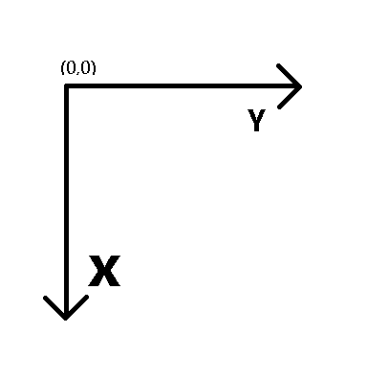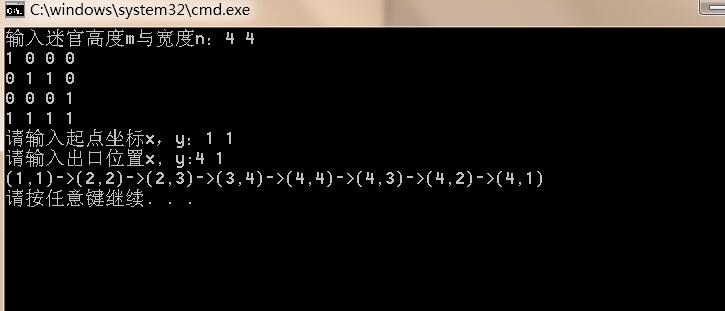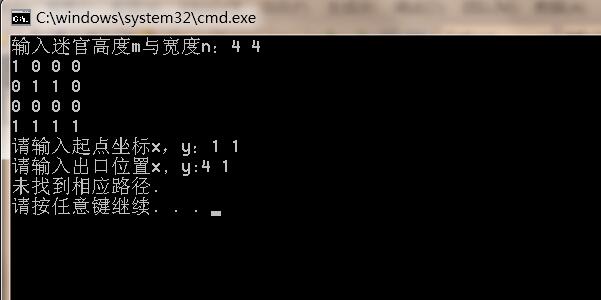要求:
利用栈实现
说明:0为墙,1为路
举例:
4X4的一个迷官
1 0 0 0
0 1 1 0
0 0 0 1
1 1 1 1
入口(1,1) 出口(4,1)
输出路径:
(1,1)->(2,2)->(2,3)->(3,4)->(4,4)->(4,3)->(4,2)->(4,1)
否则输出未找到此路。
坐标系

main.h
#ifndef main_h__
#define main_h__
#include <stdio.h>
#include "stack.h"
typedef struct move_def{
int y;
int x;
}Move;
void printout(stack s);
void process();
void initMap(int m, int n);
#endif // main_h__
main.c
#include "main.h"
int map[256][256];
int main(){
process();
return 0;
}
void printout(stack s){
stack s_t;
ElementType t;
if (isEmpty(s)){
puts("未找到相应路径.");
return;
}
initStack(&s_t, s.sz);
while (!isEmpty(s)){
t = getTop(s);
Push(&s_t, t);
Pop(&s);
}
while (!isEmpty(s_t)){
t = getTop(s_t);
printf("(%d,%d)", t.x, t.y);
Pop(&s_t);
if (!isEmpty(s_t))
printf("->");
}
printf("
");
Destory(&s_t);
}
void initMap(int m, int n){
// m 高度 n 宽度
int i, j;
for (i=0; i<m ;i++)
for (j=0; j<n; j++){
// 边缘置0
if (j==0 || j == n-1 || i==0 || i== m-1){
map[i][j] = 0;
continue;
}
scanf("%d", &map[i][j]);
}
}
void process(){
Move move[8] = {
{0,-1}, // 上
{1,-1}, // 右上
{1 ,0}, // 右
{1,1}, // 右下
{0 ,1}, // 下
{-1,1}, // 左下
{-1,0}, // 左
{-1,-1} // 上
};
int i, j; // 下次欲寻找的位置
int start_x, start_y; // 出口的位置
int end_x, end_y; // 结束的位置
int flag = 0; //找到出口 1 未找到出口 0
int m, n; // 高度 m 宽度 n
stack s;
ElementType t;
// 迷官数据初始化
printf("输入迷官高度m与宽度n:");
scanf("%d%d", &m, &n);
if (m+2 >256 || m < 0 || n+2>256 || n < 0){
printf("对不起,您输入的数据有误!大小均在256之内!");
exit(1);
}
// 左右 上下各加一行
m += 2;
n += 2;
initMap(m, n);
printf("请输入起点坐标x,y:");
scanf("%d%d", &t.x, &t.y);
t.d = 0;
if (t.x<0 || t.x>n || t.y<0 || t.y> m){
printf("对不起,您输入的数据有误!");
exit(1);
}
printf("请输入出口位置x, y:");
scanf("%d%d", &end_x, &end_y);
if (end_x<0 || end_x>n || end_y<0 || end_y> m){
printf("对不起,您输入的数据有误!");
exit(1);
}
start_x = t.x; start_y = t.y;
initStack(&s, m*n);
Push(&s, t);
while (!flag){
t = getTop(s);
map[t.x][t.y] = -1;
while (t.d < 8){
i = t.x + move[t.d].x;
j = t.y + move[t.d].y;
// 找到出口
if (i == end_x && j == end_y){
t.x = i; t.y = j; t.d = 0;
Push(&s, t);
flag = 1; break;
}
// 未找到出口
if (map[i][j] == 1){
t.x = i; t.y = j;t.d=0;
Push(&s,t);
break;
}
t.d++;
}
if (t.d == 8) {
if (t.x == start_x && t.y == start_y)
flag = 1;
Pop(&s);
}
}
printout(s);
Destory(&s);
}stack.h
#ifndef stack_h__
#define stack_h__
#include <stdio.h>
#include <malloc.h>
#include <stdlib.h>
typedef enum boolean {FALSE, TRUE} BOOL;
typedef struct ElementType_def{
int x;
int y;
int d;
}ElementType;
typedef struct stack_def{
ElementType* data;
int top;
int sz;
}stack;
void initStack(stack* s, int sz);
BOOL isEmpty(stack s);
BOOL isFull(stack s);
void Pop(stack *s);
void Push(stack* s, ElementType e);
ElementType getTop(stack s);
void Destory(stack* s);
#endif // stack_h__
stack.c
#include "stack.h"
void initStack(stack* s, int sz){
if (sz < 0){
puts("error:sz < 0");
exit(1);
}
s->sz = sz;
s->data = (ElementType*)malloc(sizeof(ElementType)*s->sz);
s->top = -1;
}
BOOL isEmpty(stack s){
return (BOOL)(s.top==-1);
}
BOOL isFull(stack s){
return (BOOL)(s.top == s.sz);
}
void Pop(stack *s){
if (isEmpty(*s)){
puts("error: Pop stack is empty.");
exit(1);
}
s->top--;
}
void Push(stack* s, ElementType e){
if (isFull(*s)){
puts("error: Push stack is Full.");
exit(1);
}
s->data[++s->top] = e;
}
ElementType getTop(stack s){
if (isEmpty(s)){
puts("error: getTop stack is empty.");
exit(1);
}
return s.data[s.top];
}
void Destory(stack* s){
free(s->data);
}
